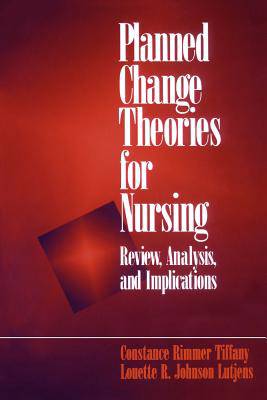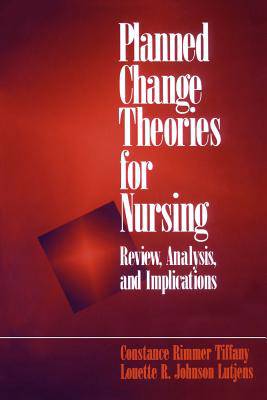
- Retrait gratuit dans votre magasin Club
- 7.000.000 titres dans notre catalogue
- Payer en toute sécurité
- Toujours un magasin près de chez vous
- Retrait gratuit dans votre magasin Club
- 7.000.0000 titres dans notre catalogue
- Payer en toute sécurité
- Toujours un magasin près de chez vous
Planned Change Theories for Nursing
Review, Analysis, and Implications
Constance Rimmer Tiffany, Louette R Johnson LutjensDescription
In a groundbreaking publication, Constance Rimmer Tiffany and Louette R. Johnson Lutjens present a foundation for nurses: understanding of planned change. Planned Change Theories for Nursing contains overviews of three widely accepted change theories and a new systems-oriented planned change theory and shows the implications of these theories for nursing practice. The first section of this book offers a thoughtful overview of the issues involved in the use of planned change theories, beginning with the rationale for studying planned change theories and important points to consider in choosing among them. The authors then explore the role of power in change and discuss moral and ethical questions involved in planned change. The final chapter in this section addresses the diagnostic process, innovations as solutions, and the evaluation of planned change. Chapter 9 serves as a transition in which the authors reflect on the implications of planned change in a representative nursing model, the well-known Roy Adaptation Model. This chapter also provides a nursing orientation for Part II, in which the authors examine in turn Lewin′s micro theories; Bennis, Benne, and Chin′s planned change writings; the Rogers Diffusion Model; and Bhola′s Configurations Model. For each of these theories or models, the authors present an overview, an analysis and critique, and a discussion entitled, "Altering the Peg," in which the theories are individually viewed in light of the key concepts in the Roy Adaptation Model. The book concludes with a discussion of the theoretical underpinnings for carrying out planned change research and incorporating research findings in nursing practice. In addition, the appendixes provide a wealth of source information for the theories discussed.
Planned Change Theories for Nursing
makes a significant contribution to the nursing literature and will be welcomed by scholars, advanced practitioners, and students in nursing administration, theory and research.Spécifications
Parties prenantes
- Auteur(s) :
- Editeur:
Contenu
- Nombre de pages :
- 416
- Langue:
- Anglais
- Collection :
Caractéristiques
- EAN:
- 9780761902355
- Date de parution :
- 01-12-97
- Format:
- Livre broché
- Format numérique:
- Trade paperback (VS)
- Dimensions :
- 170 mm x 216 mm
- Poids :
- 662 g

Les avis
Nous publions uniquement les avis qui respectent les conditions requises. Consultez nos conditions pour les avis.






